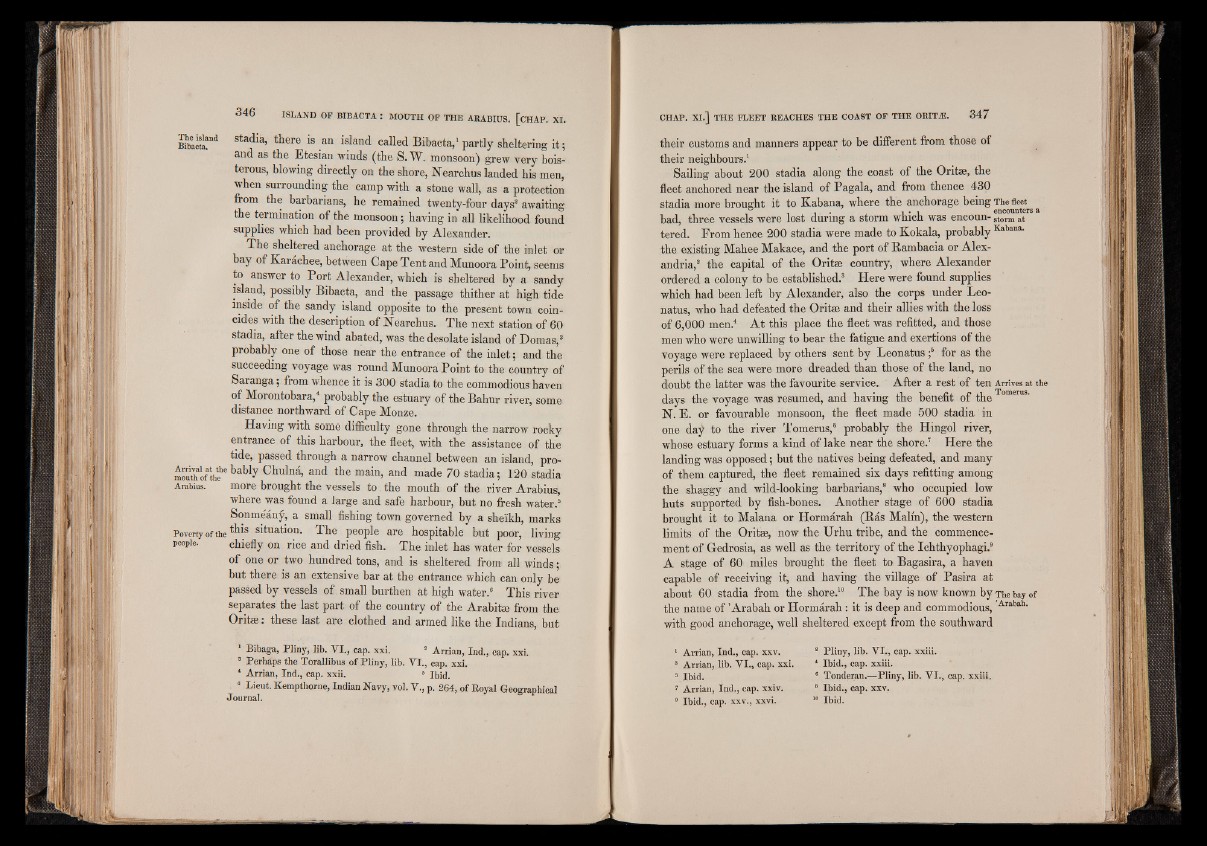
mBS*4 Sta,dia> there is an island caUed Bibacta,1 partly sheltering it;
and as the Etesian winds (the S.W. monsoon) grew very boisterous,
blowing directly on the shore, Nearchus landed his men,
when surrounding the camp with a stone wall, as a protection
from the barbarians, he remained twenty-four days2 awaiting
the termination of the monsoon; having in all likelihood found
supplies which had been provided by Alexander.
The sheltered anchorage at the western side of the inlet or
bay of Karachee, between Gape Tent and Munoora Point, seems
to answer to Port Alexander, which is sheltered by a sandy
island, possibly Bibacta, and the passage thither at high tide
inside of the sandy island opposite to the present town coincides
with the description of Nearchus. The next station of 60
stadia, after the wind abated, was the desolate island of Comas,3
probably one of those near the entrance of the inlet; and the
succeeding voyage was round Munoora Point to the country of
Saranga; from whence it is 300 stadia to the commodious haven
of Morontobara, probably the estuary of the Bahur river, some
distance northward of Cape Monze.
Having with some difficulty gone through the narrow rocky
entrance of this harbour, the fleet, with the assistance of the
tide, passed through a narrow channel between an island, promoutVhof1hehe
bably H P ! ! and the mailb and made 70 stadia; 120 stadia
Arabius. more brought the vessels to the mouth of the river Arabius,
where was found a large and safe harbour, but no fresh water.6
Sonmeany, a small fishing town governed by a sheikh, marks
Poverty of the situation. The people are hospitable but poor, living
people. chiefly on rice and dried fish. The inlet has water for vessels
of one or two hundred tons, and is sheltered from all winds;
but there is an extensive bar at the entrance which can only be
passed by vessels of. small burthen at high water.6 This river
separates the last part of the country of the Arabitee from the
Orifee: these last are clothed and armed like the Indians, but
1 Bibaga, Pliny, lib. V I., cap. xxi. 2 Arrian, Ind., cap. xxi.
3 Perhaps the Torallibus o f Pliny, lib. VI., cap. xxi.
‘ Arrian, Ind., cap. xxii. 5 Ibid.
6 Lieut. Kempthorne, Indian Navy, vol. V., p. 264, of Royal Geographical
Journal.
their customs and manners appear to be different from those of
their neighbours.1
Sailing about 200 stadia along the coast of the Oritae, the
fleet anchored near the island of Pagala, and from thence 430
stadia more brought it to Kabana, where the anchorage being The fleet
. encounters a bad, three vessels were lost during a storm which was encoun- 8torm at
tered. From hence 200 stadia were made to Kokala, probably Kabana-
the existing Mahee Makace, and the port of Kambacia or Alexandria,
8 the Capital of the Oritae country, where Alexander
ordered a colony to be, established.3 Here were found supplies
which had been left by Alexander, also the corps under Leo-
natus, who had defeated the Oritse and their allies with the loss
of 6,000 men.4 At this place the fleet was refitted, and those
men who were unwilling to bear the fatigue and exertions of the
voyage were replaced by others sent by Leonatus ;5 for as the
perils of the sea were more dreaded than those of the land, no
doubt the latter was the favourite service. After a rest of ten Arrives at the
days the voyage was resumed, and having the benefit of the omer
N. E. or favourable monsoon, the fleet made 500 stadia in
one day to the river Tomerus,6 probably the Hingol river,
whose estuary forms a kind of lake near the shore.'' Here the
landing was opposed; but the natives being defeated, and many
of them captured, the fleet remained six days refitting among
the shaggy and wild-looking barbarians,8 who occupied low
huts supported by fish-bones. Another stage of 600 stadia
brought it to Malana or Hormarah (Has Malm), the western
limits of the Oritae, now the Urhu tribe, and the commencement
of Gedrosia, as well as the territory of the Ichthyophagi.9
A stage of 60 miles brought the fleet to Bagasira,, a haven
capable of receiving it, and having the village of Pasira at
about 60 stadia from the shore.10 The bay is now known by The bay of
the name of ’Arabah or Hormarah: it is deep and commodious, rabab'
with good anchorage, well sheltered except from the southward
1 Arrian, Ind., cap. xxv. 8 Pliny, lib. V I,, cap. xxiii.
8 Arrian, lib. V I., cap. xxi. 1 Ibid., cap. xxiii.
5 Ibid. 6 Tonderan.—Pliny, lib. V I., cap. xxiii.
7 Arrian, Ind., cap. xxiv. 8 Ibid., cap. xxv.
9 Ibid.. can. xxv., xxvi. 10 Ibid.